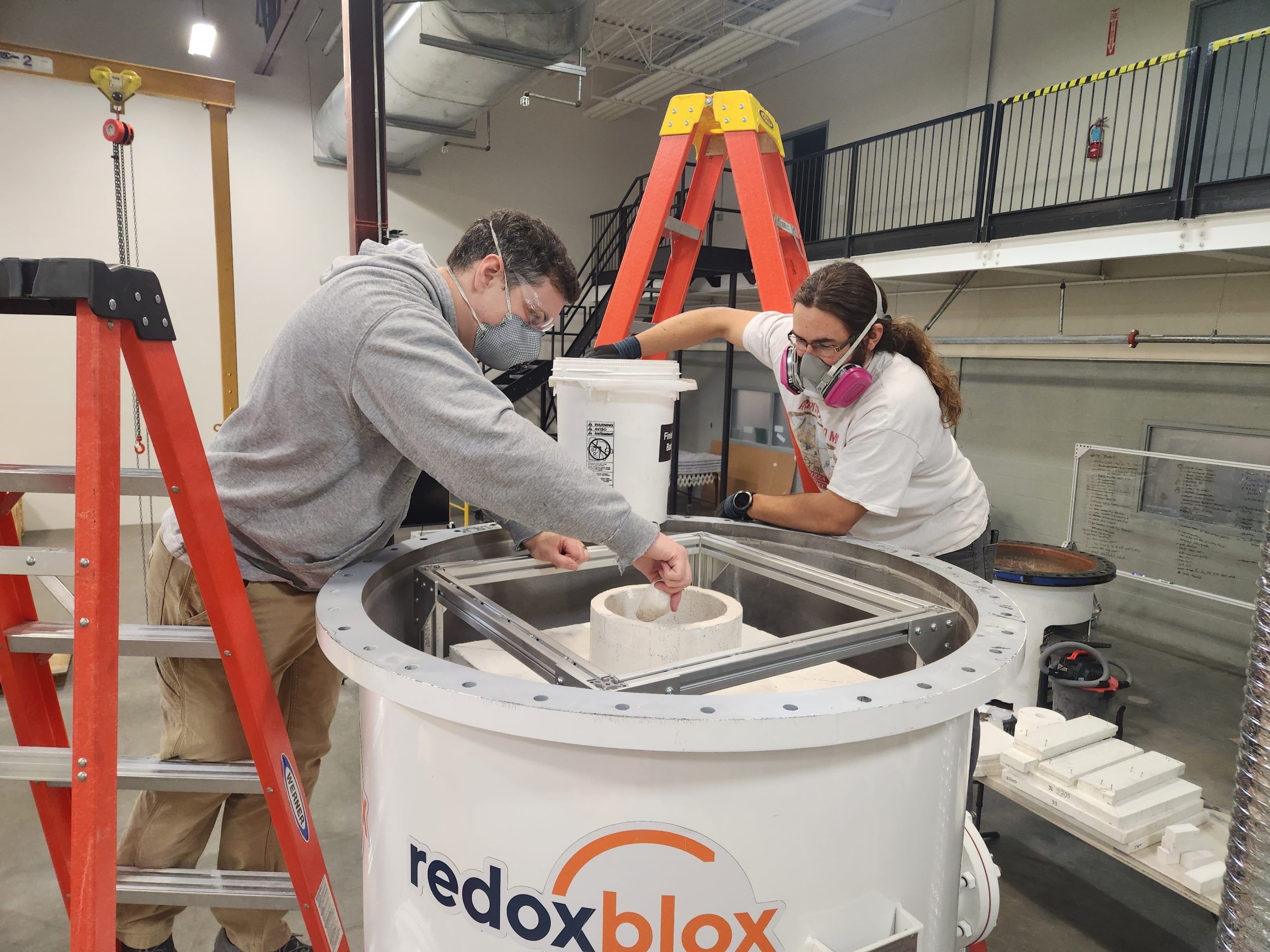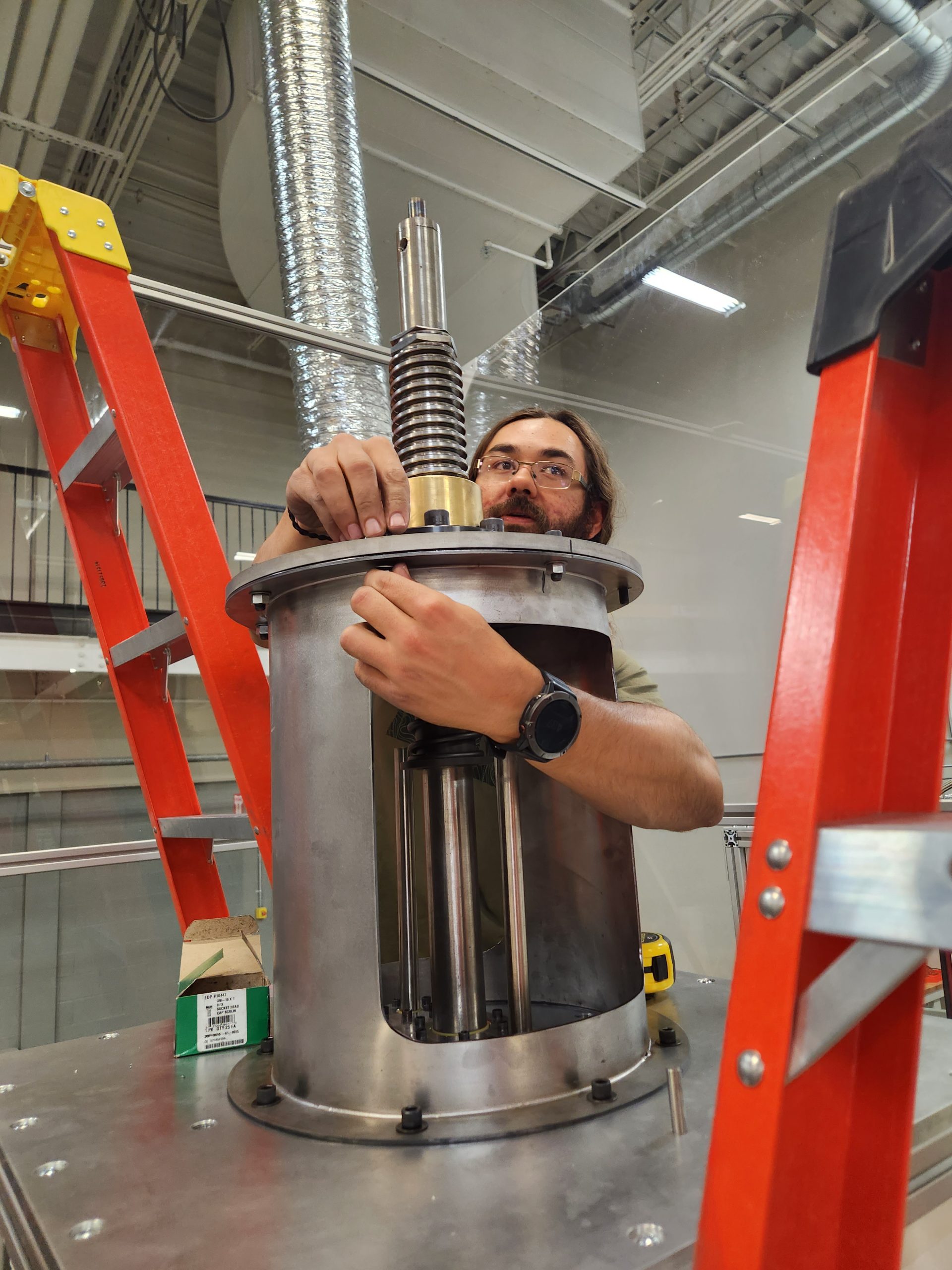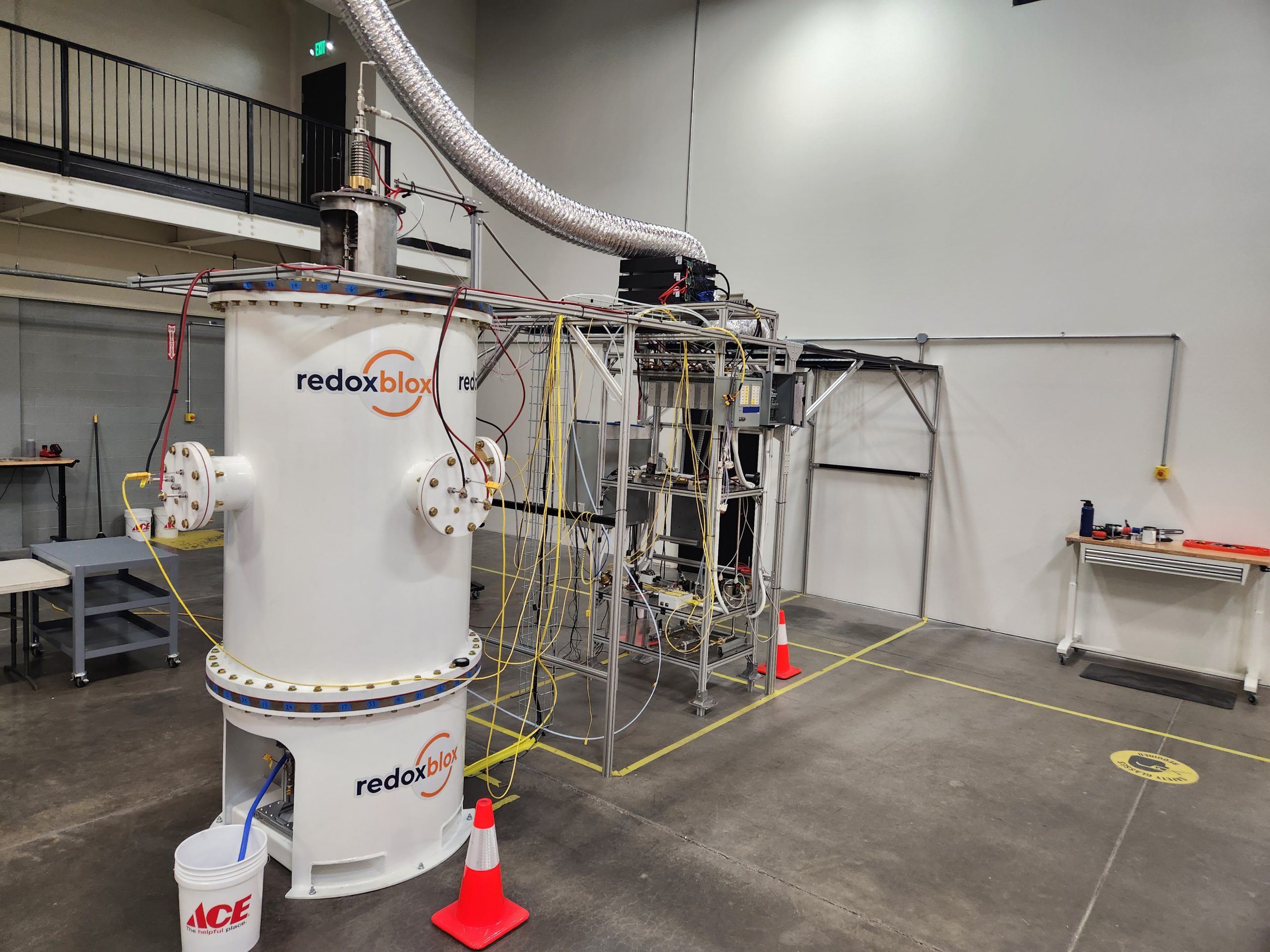Addressing the urgent need for sustainable energy solutions and making the power grid more reliable are two noteworthy goals of a new, fast-growing company whose technology was developed at Michigan State University (MSU). RedoxBlox, named the 2024 MSU Startup of the Year, is at the forefront of energy storage technology, providing innovative solutions for power generation and industrial heat applications.
Developed by MSU Research Foundation Professor James F. Klausner, Ph.D., and his team, RedoxBlox’s groundbreaking technology harnesses excess renewable electrical energy or generated heat, stores it efficiently, and releases it as high-temperature air or electricity on demand.
“To decarbonize is the major driving impetus for our technology and why we exist as a company,” said Klausner, co-founder and executive chairman of RedoxBlox. “We’re targeting industrial heat and grid storage. If we decarbonize both those industries, that addresses about half of all carbon emissions around the world, so that has a huge impact. But we do not rely on the goodwill of others wanting to decarbonize. We rely on being competitive against natural gas. We rely on a good business proposition to decarbonize.”
It’s no secret that burning fossil fuels releases carbon dioxide and other harmful pollutants into the air, contributing to global warming. Renewable energy sources such as solar, wind, and hydropower offer a cleaner and more sustainable alternative, but their intermittent nature has been a challenge. RedoxBlox’s energy storage technology addresses this issue, expanding the potential of renewable energy sources and enhancing grid stability, thus supporting the transition to a more sustainable and resilient energy infrastructure.
The RedoxBlox storage module is a remarkable feat of engineering. It utilizes a receptacle filled with inexpensive metal oxide pellets that are non-toxic, non-flammable, and fully recyclable. By triggering a reversible chemical reaction, the system stores renewable electricity as chemical energy at temperatures up to 1500°C, mimicking the output of a natural gas combustor.
 The company can retrofit any equipment that currently burns natural gas and decarbonize it by storing renewable electricity in the RedoxBlox system until it is delivered later for a different need.
The company can retrofit any equipment that currently burns natural gas and decarbonize it by storing renewable electricity in the RedoxBlox system until it is delivered later for a different need.
“We believe it’s the cheapest, fastest way to decarbonize, to go from methane natural gas to renewables,” said RedoxBlox CEO Dane Boysen, Ph.D.
This innovation’s core is a reversible redox cycle, a breakthrough that has eluded researchers for decades. “People have been working on trying to make redox cycles reversible for about half a century, and they cracked that,” he said. “If we could, we would make gasoline reversible, but it’s really hard to go backwards from combusting the gasoline to put the CO2 in the water and everything all back together again and put it back into oil. But this is basically the next best thing. We like to call it ‘reversible combustion.'”
MSU’s ecosystem for innovation helps fuel the growth of RedoxBlox
The metal oxide material that became the company’s core innovation was discovered in 2018 when Klausner was at the University of Florida. After a stint at the Department of Energy’s Advanced Research Projects Agency-Energy (ARPA-E), Klausner brought his team to MSU, where they continued developing the technology with support from the MSU College of Engineering and government grants.
 Recognizing the commercial potential, Klausner recruited Boysen, a seasoned entrepreneur in clean technology, to lead the company’s commercialization efforts in 2020. RedoxBlox also took advantage of the abundant programmatic, legal, and financial resources that the MSU entrepreneurial ecosystem can provide to startups. According to Klausner, Spartan Innovations, a subsidiary of the MSU Research Foundation, was instrumental in RedoxBlox’s growth by connecting the emerging company to talent, resources, and vendors, securing space on campus, and providing seed money.
Recognizing the commercial potential, Klausner recruited Boysen, a seasoned entrepreneur in clean technology, to lead the company’s commercialization efforts in 2020. RedoxBlox also took advantage of the abundant programmatic, legal, and financial resources that the MSU entrepreneurial ecosystem can provide to startups. According to Klausner, Spartan Innovations, a subsidiary of the MSU Research Foundation, was instrumental in RedoxBlox’s growth by connecting the emerging company to talent, resources, and vendors, securing space on campus, and providing seed money.
“We had Ph.D. students and postdocs who worked on the research who eventually became co-founders. All the core talent for the technology came out of MSU. This business is also very capital-intensive and could not have been created without significant venture capital funding.”
So began a multi-million-dollar seed funding round in 2020. As one of the most active groups in the Midwest focused on early-stage investing, Red Cedar Ventures, a venture investment subsidiary of the MSU Research Foundation, recognized the potential of the RedoxBlox technology and supported it from the outset.
“We were one of the first investors, and we’ve made multiple investments in RedoxBlox over the last few years,” said Jeff Wesley, Executive Director of Ventures at the MSU Research Foundation. “So that says a lot for our support of them and what they’re doing because we don’t do that with everyone. The company has also done a fabulous job of getting non-dilutive capital,” he added, “which is mostly grants on their way to commercialization. You don’t always see that with startups. This is a company that’s on a really good trajectory.”
Now headquartered in San Diego, with facilities in Oregon and Austria, RedoxBlox is poised to significantly impact the energy industry.
“The folks at [the MSU Research Foundation] were great to work with,” Boysen said. “Their resources and always being willing to help definitely made life easier in terms of getting things going. It’s nice to have a friendly investor-partner in your corner because not all investors are like that.”
From venture capital to the marketplace
Boysen estimates that the company could reach half a billion in revenue by 2030, a year he refers to as a “magic number” due to the potential tax credits offered by the Inflation Reduction Act.
“We have to get a product out within the next two years to really take advantage of those tax credits, but they start expiring in 2030,” Boysen said. “I think the Inflation Reduction Act production tax credit will be just a huge boom for us. It’s like putting our company on steroids.”
For its heat applications, RedoxBlox targets heavy industries such as chemicals, steel, cement, and food and beverage. It also aims to provide storage solutions for the grid, partnering with utility companies and large energy consumers.
 “To put things in perspective, an industrial boiler represents about a megawatt of thermal energy,” Klausner explained. “To get into the industrial heat market, we can have a unit the size of 10 megawatt hours to give a good quantity of energy storage. To get into the electric power market, we probably need a minimum of hundreds of megawatt hours. It takes power plant-size storage to get into that market. So, we’re focused on industrial heat in the near term because it’s an easier market to get into. But we’re also focused on power generation applications for the future.”
“To put things in perspective, an industrial boiler represents about a megawatt of thermal energy,” Klausner explained. “To get into the industrial heat market, we can have a unit the size of 10 megawatt hours to give a good quantity of energy storage. To get into the electric power market, we probably need a minimum of hundreds of megawatt hours. It takes power plant-size storage to get into that market. So, we’re focused on industrial heat in the near term because it’s an easier market to get into. But we’re also focused on power generation applications for the future.”
RedoxBlox’s first major customer is Dow Chemical Company, where a 10-megawatt-hour unit will be installed at Dow’s West Virginia chemical plant as part of a Department of Energy demonstration project.
“One of the biggest challenges is just the time it takes to develop hardware technology,” Boysen admitted. “Hardware technology is both expensive and takes time. It’s particularly hard when you’re pitching to investors in Silicon Valley who are used to software companies where all you need to start a company is a box of donuts and a laptop. What we do is a lot more capital-intensive and takes a lot more time. When you raise money, you set a ticking time clock. So that really is our biggest challenge, just racing against time.”
However, the investment community remains bullish on RedoxBlox and its mission to bring renewable energy solutions to the market. “When you have venture groups coming in who are interested in a startup in the very early stages, they know it’s a risk, but if they feel the potential reward is higher than the risk, then they’re willing to take it,” said Anne DiSante, Executive Director of MSU Technologies. “We’re really excited about their future.”
Is your company ready to learn more about working with Michigan State University’s faculty on sustainability innovations? Click HERE
About the MSU Innovation Center:
The MSU Innovation Center is dedicated to fostering innovation, research commercialization, and entrepreneurial activities from the daily research and discovery happening across our campus. We act as the primary interface for researchers aiming to see their research applied to solving real-world problems and making the world a better place to live. We strive to empower faculty, researchers, and students within our community of scholars by providing them with the knowledge, skills, and opportunities to bring their discoveries to the forefront. Through strategic collaborations with the private sector, we aim to amplify the impact of faculty research and drive economic growth while positively impacting society. We foster mutually beneficial, long-term relationships with the private sector through corporate-sponsored research collaborations, technology licensing discussions, and support for faculty entrepreneurs to support establishing startup companies.

